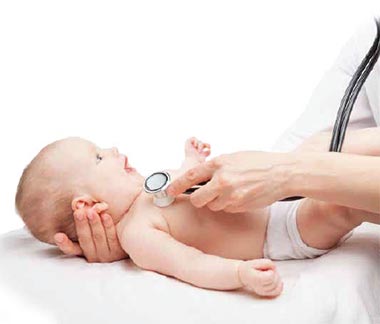We’re Having a Baby! What You Need to Know
Congratulations! You’re having baby. Creating a new life is one of the most amazing things a woman can do, but, like most things, preparation is key and it starts even before you buy your first early pregnancy test.
First, you need to make sure your body is in optimum condition to carry a baby for nine months. You should make an appointment with your OB-GYN or primary-care physician to make sure your immunizations are up to date and that your overall health is good. Pregnancy is not a time to lose weight, so it is best to get to your ideal weight in advance. A healthy diet is not only good but essential during pregnancy. Certain foods, such as raw or undercooked meats – say no to sushi or rare burgers – and unpasteurized dairy products should be avoided, along with smoking, alcohol and drug use.
Dr. Bridget Williamson of East Cooper OB-GYN advised that “It can be a good idea to meet with your doctor before you consider getting pregnant to discuss any family history of birth defects or any specific risk factors you may have.”
Dr. Williamson recommended starting prenatal vitamins before you conceive and continue even into the postpartum period. In addition, some women may need supplements such as folic acid, iron, calcium or DHA – docosahexaenoic acid – which helps the development of your baby’s brain and eyes. In addition, certain tests are performed to assure the health and safety of mother and child.
“All women should have routine prenatal testing, which includes blood work to determine blood type, blood count and screening for sexually transmitted infections,” Dr. Williamson said, adding that “some women may be interested in testing for genetic conditions such as Down syndrome or cystic fibrosis.”
Dr. Michelle Meglin, an obstetrician with MUSC, suggested that couples preparing for pregnancy take precautions to avoid exposure to the Zika virus.
“Currently, the CDC recommends avoiding travel to areas of active Zika transmission for men and women who are trying to conceive or planning to have a baby in the near future,” Dr. Meglin said. Those areas include most of the Caribbean, Central and South America and parts of Florida.
For the most part, women can continue normal activities and, in fact, exercise is encouraged. It is not the time to start a running routine or other vigorous, and contact sports should be avoided. Pregnancy is a good time to educate yourself about birthing options. There are many informative books on the subject, as well as labor and delivery classes.
“A great way for women to prepare for birth is to take a childbirth class,” Dr. Meglin advised. “At MUSC, we offer childbirth, breast-feeding, newborn care and infant CPR classes.”
It is wise to discuss your preferences with your obstetrician, who will strive to make sure your wishes are met. It is important to be flexible, to understand that conditions may indicate the necessity of a cesarean delivery. In the past, women who underwent a cesarean delivery were not offered the option of a vaginal birth for subsequent pregnancies, but that is no longer the case.
“Most women who have had a cesarean delivery will have the option of a trial of labor,” Dr. Williamson explained. Also known as TOLAC (trial of labor after cesarean) or VBAC (vaginal birth after cesarean), there are many factors involved, such as the reason for the first cesarean section, the age or weight of the mother and potential risk factors.
“If opting for a TOLAC, then several additional safety measures may be put into place during labor, including intravenous access, continuous monitoring of the baby’s heart rate, close proximity to an operating room and a medical team readily available,” Dr. Williamson advised.
According to Dr. Meglin, MUSC is part of the Baby-Friendly Hospital Initiative, which means they are dedicated to family-centered birth experiences.
“Having a medicated birth does not necessarily mean an epidural,” Dr. Meglin said, adding that “there are other options, including IV pain medications and nitrous oxide gas. If a cesarean delivery is needed, the delivery can still be a patient- and family-centered birth.”
Both Dr. Williamson and Dr. Meglin encourage fathers to be involved by attending doctor’s appointments, especially those including ultrasounds, and by being attentive to the mother’s needs, especially if she experiences nausea or aches and pains. During birth, fathers can assist by cutting the cord and bonding with the infant. Skin-to-skin contact is particularly important.
The decision to breast-feed is a very personal one. It is very beneficial in providing important nutrients and antibodies to the baby. Dr. Meglin said that breast-feeding reduces the risk of sudden infant death syndrome and reduces the chance that the baby will be overweight.
“For moms, breast-feeding improves weight loss after delivery, triggers the release of a hormone that causes the uterus to contract and return to normal size and reduces the risk of breast and ovarian cancer,” said Dr. Meglin, adding that although it is hard work, it is very rewarding.
Pregnancy, with all it discomforts, is a joyful event in the lives of the expectant parents. Growing a human being is an incredible experience. Savor those early months of infancy, because one day you’ll look around to see that sweet baby going to college. They grow up so much faster than you can imagine!
Advice From a Pediatrician: How to Raise a Child
You’ve been through pregnancy, successfully delivered a baby and spent two or three days in the hospital with nurses offering advice. You’ve prepared a nursery, installed a car seat and loaded up on diapers. Now you’ve been sent home with a baby to care for until your child reaches adulthood.
Wait – shouldn’t they have given you a manual?
The first few months, your baby will sleep, eat and repeat. There will be frequent diaper changes. You’ll wonder how something so small could require so many diapers and make you so tired.
It gets easier.

Your new friend the pediatrician is an expert and will advise you through the next 18 years or so. A happy, healthy baby is their goal, too. Typically, you and your newborn will drop by the pediatrician’s office a few days after you get home and continue regular well-baby checkups for the first two years. Your pediatrician will guide you through the developmental stages, screen for possible health or safety issues and anticipate your questions.
Dr. Luke Edmondson is an assistant professor with MUSC Children’s Care in Moncks Corner. He advises seeing a doctor more frequently if your child has certain conditions such as asthma or attention deficit hyperactivity disorder.
“Also, children should go to their primary care provider’s office for more common complaints. Examples would include the common cold, rashes, ear pain, vomiting and diarrhea, constipation, runny nose, congestion and coughing,” Dr. Edmondson advised.
The exceptions would be broken bones, severe respiratory symptoms, head injuries or abdominal pain, to mention a few. In these instances, parents should take their child to the nearest emergency room. If you’re not certain the situation warrants emergency care, call your physician’s office for advice.
“Any baby less than 2 months old with a fever should go to the emergency room, as a fever could be a sign of a serious infection that needs to be evaluated and treated right away,” Dr. Edmondson said.
Vaccinations are extremely important for maintaining your child’s health. They are considered safe and effective at preventing some very serious diseases and are recommended by both the Centers for Disease Control and Prevention and the Advisory Committee on Immunization Practices.
“In my opinion, vaccines are the most important things you can do to make sure your child stays healthy,” Dr. Edmondson said.
Recommended vaccines include hepatitis B, diphtheria, tetanus, pertussis, pneumococcal, polio, hemophilus influenza type B, rotavirus, measles, mumps, rubella, varicella (chickenpox), hepatitis A, HPV and meningitis.
“In addition to these routine vaccinations, all children 6 months and older should get an influenza vaccine every year,” Dr. Edmondson reminded.
If you travel outside the United States with children, additional vaccines may be necessary.
Naturally, in spite of your best efforts, your child will occasionally experience issues such as the common cold, strep throat, ear infections and rashes. Chronic conditions such as asthma, obesity, mental health issues or ADHD can be managed by your pediatrician.
More than one family has experienced the difficulty of picky eaters – children who will eat only a handful of items or reject vegetables completely. Generally, if your child is growing and gaining an appropriate amount of weight for their age, it is best not to obsess. It makes the parents nuts and may cause a future eating disorder. That said, Dr. Edmondson recommends a balanced diet that includes five servings of fruit and vegetables daily.
“If you have a picky eater, I recommend that you not give your child sugary beverages,” Dr. Edmondson suggested, adding that the list includes juice, sweet tea, soda, Kool-Aid and flavored milk.
“The extra sugar your child gets from these drinks can decrease appetite for the nutritious food they need,” he explained.
Remember to set a good example because your kids are watching you. If you reject certain foods or eat a poor diet, they are likely to follow suit. It is important to set the mood for meals by eating at the table and turning the TV and electronics off. Offer three balanced meals plus healthy snacks in between, but do not stress if your children eat less at one meal and more at another.
Your pediatrician can advise if you need to supplement your child’s diet with vitamins such as vitamin D, but they usually are unnecessary.
In today’s electronic world, where babies know how to swipe on an iPad, exercise is more important than ever. Dr. Edmondson advises that children get a least one hour of exercise per day, whether structured, such as participating in sports, or unstructured, such as playing outside, and to make sure they have all the necessary safety equipment.
Sleep is of paramount importance. Sleep is when the brain and body renew themselves, so if children do not get sufficient sleep, the result may be behavioral problems. Most children under the age of 4 benefit from a daily nap. Maintain a bedtime routine, putting away all electronics at least an hour before your kids go to sleep and encouraging quiet activities such as coloring or reading to wind down.
“Our brains want us to go to bed and wake up at the same time every day, including the weekend,” Dr. Edmondson said.
Perhaps the best advice of all is to enjoy your kids during the growing up years. You’re going to miss them when they’re gone.
By Barbara Millen Patrick







